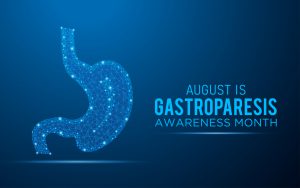 August is Gastroparesis Awareness Month. Gastroparesis is a condition that affects the normal spontaneous movement of the muscles or motility in your stomach.
August is Gastroparesis Awareness Month. Gastroparesis is a condition that affects the normal spontaneous movement of the muscles or motility in your stomach.
There are many signs and symptoms of gastroparesis which include:
- Vomiting
- Nausea
- Abdominal bloating
- A feeling of fullness after eating a few bites
- Vomiting undigested food that was eaten a few hours earlier
- Acid reflux
- Changes in blood sugar levels
- Lack of appetite
- Weight loss and malnutrition
Many people with gastroparesis don’t have any noticeable signs or symptoms of the condition.
The cause of gastroparesis is unclear, however, some cases have been caused by damage to the vagus nerve which controls the stomach muscles. The vagus nerve helps manage the complex processes in the digestive tract like signaling the muscles in your stomach to contract and push food into the small intestine.
The vagus nerve can also be damaged by diseases such as diabetes, as well as complications from stomach, or abdominal surgeries.
Other factors that can increase your risk of gastroparesis include:
- Esophageal surgery
- Infection, usually from a virus
- Certain medications that slow the rate of stomach emptying, such as narcotic pain medications
- Scleroderma- a connective tissue disease
- Nervous system diseases, such as Parkinson’s disease or MS
- An underactive thyroid
Women are more likely to develop gastroparesis than men. The condition can lead to several complications, including:
- Severe dehydration
- Malnutrition
- Undigested food that hardens and remains in your stomach
- Unpredictable blood sugar changes
- Decreased quality of life
Doctors use several tests to help diagnose gastroparesis so they can rule out conditions that cause similar symptoms. These tests include:
- Gastric emptying tests
- Scintigraphy
- Breath tests
- Upper gastrointestinal endoscopy
- Ultrasound
The treatment for gastroparesis begins with identifying and treating the underlying condition. For example, if diabetes is the cause of your gastroparesis, your doctor can work with you to help control it.
Other treatments may include:
- Changes to your diet
- Eating smaller meals more frequently
- Chewing food thoroughly
- Eating well-cooked fruits and vegetables instead of raw
- Avoiding fibrous fruits and vegetables
- Choosing mostly low-fat foods
- Eating soups and pureed foods if liquids are easier to swallow
- Drinking about 34-51 ounces of water a day
- Avoiding carbonated drinks, alcohol, and smoking
- Waiting for at least two hours to lie down after a meal
- Taking a daily multivitamin
- Medications
- To stimulate the stomach muscles
- To control nausea and vomiting
- Surgical treatment
If you are suffering from symptoms of gastroparesis, schedule an appointment with a gastroenterologist at Jamaica Hospital Medical Center by calling (718) 206-6742.
All content of this newsletter is intended for general information purposes only and is not intended or implied to be a substitute for professional medical advice, diagnosis or treatment. Please consult a medical professional before adopting any of the suggestions on this page. You must never disregard professional medical advice or delay seeking medical treatment based upon any content of this newsletter. PROMPTLY CONSULT YOUR PHYSICIAN OR CALL 911 IF YOU BELIEVE YOU HAVE A MEDICAL EMERGENCY.
